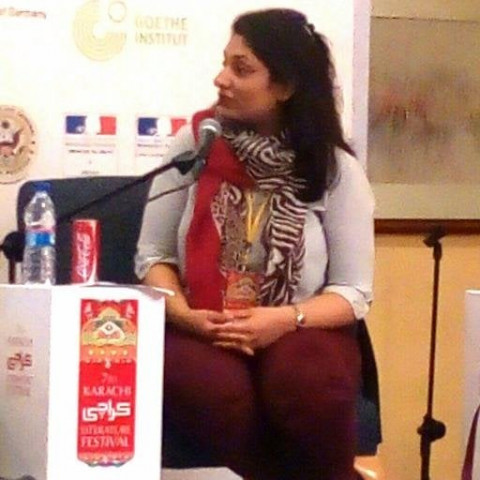The myth-maker, the storyteller and the explorer
“A lot of what I write comes from an urge to make up for what was never said,” she claimed

“A lot of what I write comes from an urge to make up for what was never said,” she claimed PHOTO: @BinaShah
Legends and modernity were juxtaposed in the ‘South Asian English Fiction: Where History and Mythology Meet’ session on the final day of the Karachi Literature Festival. Three authors, Kamila Shamsie, Bina Shah and Uzma Aslam Khan, spoke about their own literary works, all of which made liberal use of the sub-continent’s numerous myths and legends with moderator Muneeza Shamsie.
“All myths are invented stories,” mused Khan, who claimed that students, especially ones from English-medium schools like herself, are not often encouraged to explore Pakistan’s history, other than the tales in mainstream textbooks. “A lot of what I write comes from an urge to make up for what was never said,” she claimed.

She spoke of a character from one of her novels, Amal, who wanted to be a palaeontologist but had to deal with the unfortunate myth that public spaces belong to men. In her work, scraping the dirt from fossils, Amal then learns to look beyond what she was taught, related Khan.
In her novels she interwove myths such as the legend of Saiful Muluk and Kaghan Valley folklore. “In the book I was trying to create the myth that everything alive is a movement and every movement is alive,” Khan claimed, speaking of her novel ‘Thinner than Skin’.
Soft-spoken sentences and gentle nods granted the session an air of deceptively frail femininity - an all-female panel, a female moderator and an audience filled with women - was juxtaposed with the harsh truths being discussed. One of which was the white-washing of powerful and influential female figures in mythology by male historians. Kamila claimed that due to a lack of education, males were designated as writers of mythology and history, while women were relegated to domestic roles, “recasting them as mother figures without the power,” according to Shah.
“History is not a dead thing in a textbook, it’s something we create all the time,” she explained, adding that authors must truly believe in mythology in order to write about it. “The biggest change [in South Asian fiction] is that we stopped being represented and started representing ourselves,” she claimed. Shah wrote about Bhittai’s seven queens, claiming that “Bhittai was definitely a feminist. He used them to say something important about the division between the divine and the mundane”.
The erasing of feminist narrative was a recurring theme throughout the session, with the writers terming written history patriarchal and oral history matriarchal. Kamila went so far as to claim that the written word has more weight in society, so people often disregard the intensely emotional oral narrative. “Mythology is a lot more democratic than we give it credit for,” claimed Shah. “The voices, presence and roles of women are often downplayed by the men writing [the mythology],” she lamented.
Kamila spoke of a piece on display at the Peshawar Museum, of the goddess Kriti and her warrior consort. According to her, the goddess’s existence dates back to the Gandhara civilisation where she was a demon who killed children. When Buddhism spread in the area they could not get rid of Kriti completely so they domesticated her and turned her into the patron goddess of children, she laughed.
“Art is the only thing that allows you to remain sane when there’s no reason to be sane at all,” claimed Kamila about the divide between art and life.
Published in The Express Tribune, February 8th, 2016.



















COMMENTS
Comments are moderated and generally will be posted if they are on-topic and not abusive.
For more information, please see our Comments FAQ